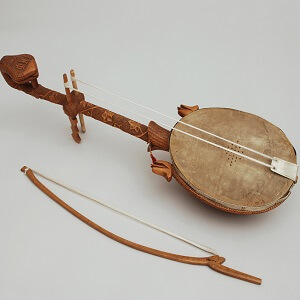Gusle
 The gusle is an one-string bowed lute chordophone of the Dinaric Mountains region of Serbia, Montenegro, and Bosnia-Hercegovina in the Balkans (southeastern Europe). It is played by male epic singers (guslar) to accompany themselves. Like many gusle, the specimen pictured here is zoomorphic, featuring a horsehead finial (detail #2) and an unidentified animal-head tuning peg (detail #3). Much of the rest of the instrument’s exposed surfaces are covered with fine geometric patterns chip carved into the wood (detail #4 shows the carving on the backside of the resonator). [This gusle is missing its pressure bridge and horsehair bow, and a synthetic string has replaced its original multi-strand horsehair string.] The gusle serves as a symbol of several Balkan national identities.
The gusle is an one-string bowed lute chordophone of the Dinaric Mountains region of Serbia, Montenegro, and Bosnia-Hercegovina in the Balkans (southeastern Europe). It is played by male epic singers (guslar) to accompany themselves. Like many gusle, the specimen pictured here is zoomorphic, featuring a horsehead finial (detail #2) and an unidentified animal-head tuning peg (detail #3). Much of the rest of the instrument’s exposed surfaces are covered with fine geometric patterns chip carved into the wood (detail #4 shows the carving on the backside of the resonator). [This gusle is missing its pressure bridge and horsehair bow, and a synthetic string has replaced its original multi-strand horsehair string.] The gusle serves as a symbol of several Balkan national identities.
The spoon-shaped monoxyle string carrier (detail #1), made from a single block of maple, has a hollow resonator covered with a goatskin soundtable (torn and not in playable condition on this instrument) the edge of which has dozens of small holes each of which is stretched over a tiny peg inserted into the outside rim of the resonator (detail #5). Ten small punctures have been made in the middle of the soundtable to serve as soundholes, and four further soundholes are drilled in the middle of the back of the resonator (detail #4). The single string runs from the tuning peg (detail #3) to an integral post at the base of the resonator rim (detail #6). The pressure bridge that would be held in place against the soundboard between the sound holes and the lower edge of the resonator is missing on this instrument. Also missing is the bow, which would be made from bent hardwood and horsehair.